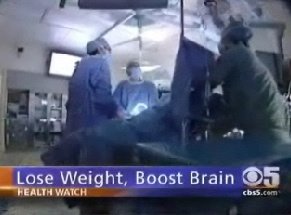
Phoenix, AZ
Many extremely obese people these days, under the mistaken belief that it will be the answer to their health problems, are flocking to get gastric bypass surgery. Now this treatment option may be pushed on even more people. A study published in The American Journal of Managed Care reports that bariatric surgery can "pay for itself" by diminishing the number of insurance claims filed by people who are grossly overweight.
Gastric Bypass Surgery Is No Picnic
However, gastric bypass surgery has many associated risks. The risks, according to a Mayo Clinic article, include death, blood clots in the legs, leaking at the staple lines in the stomach, incision hernia, narrowing of the opening between the stomach and small intestine, dumping syndrome, iron deficiency anemia, vitamin B-12 deficiency, vitamin D deficiency, dehydration, gallstones, bleeding stomach ulcers, intolerance to certain foods, kidney stones, low blood sugar, body aches, fatigue (like when one has the flu), feeling cold, dry skin, hair thinning and hair loss, and mood changes. Of course, there are also the same risks that go along with any surgery, like bleeding, infections, and adverse reactions to the anesthesia. That doesn't exactly sound like a picnic, no pun intended.
Will Surgery Save Insurance Companies Money?
Unfortunately, there is even more reason to be concerned about gastric bypass surgery. Dr. Douglass warns in an article that the funding for the study that purports that this surgery will save insurance companies money came from a company known as Johnson & Johnson's Ethicon Endo-Surgery, Inc., which is a major manufacturer of bariatric surgical instruments. Additionally, Dr. Douglass points out that Dr. Scott Shikora, a co-author of the study, is the president of the American Society for Metabolic and Bariatric Surgery. It's easy to see that the members of this group would clearly benefit if insurance providers would decide that they could save money if more patients were approved for this course of treatment.
Up to Five Percent Die Within a Year of Surgery
The sad truth of the matter is that, according to Dr. Douglass, up to five percent of the patients who undergo this course of treatment are dead within a year. (That's certainly one way to trim down future medical costs.) While Dr. Douglass believes that surgery should always be a last resort, many other doctors believe that the current requirement by insurance companies that people first try to lose weight by a six-month doctor-supervised weight loss program is unreasonable. Says Douglass: "People like Shikora would prefer that patients go right from the dining room table to his operating table." While natural health advocates might not agree with Dr. Douglass on all of the issues, most certainly appreciate his acerbic wit. Hmmm... was the guy who said that "the way to a man's heart is through his stomach" a bariatric surgeon?
Labels: bariatric surgery, gastric bypass risks, gastric bypass side effects, gastric bypass surgery, gastric bypass surgery education







